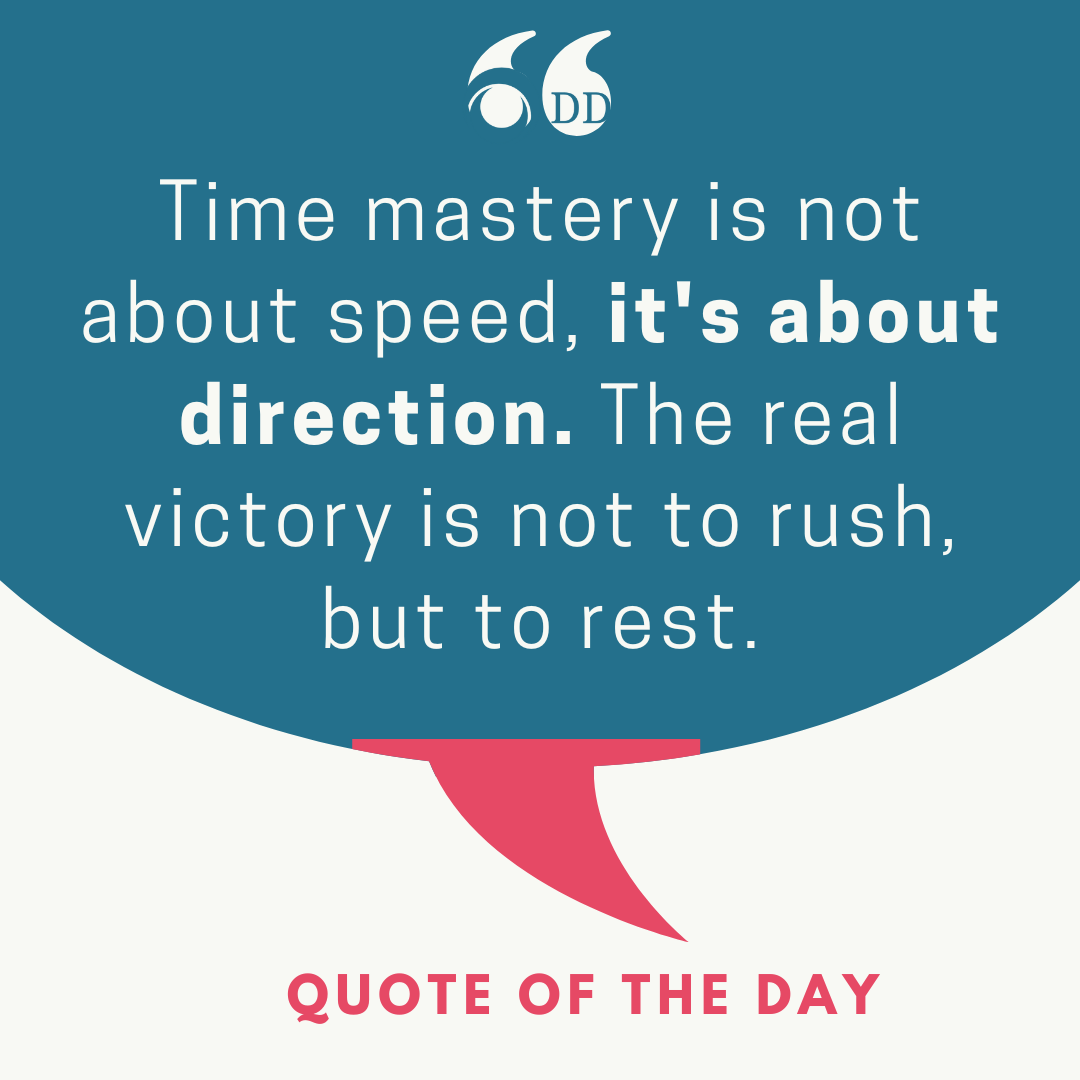Diligent Sunday Newsletter / Issue #20 about the Time Serenity
Discover the importance of Time Serenity: shift from constant productivity to a serene approach. Learn strategies for balanced time management and explore core aspects like mindfulness and gratitude.

Introduction
Dear Diligent Sunday Readers,
Another week has passed, and we are now in the 23rd calendar week, with 43.3% of the year behind us.
I have had a busy week, with continuous business trips until Saturday. Although it is good for building relationships at work, returning to piles of emails, tasks, notifications, household chores, neglected routines, and habits feels overwhelming.
The feeling of "catching up" on everything to start the week organised on Monday is natural, but is it the right mindset?
Is it productive to think that the past six days have not been utilised to the fullest and that the next six must be twice as effective to avoid losing potential or growth?
In my 20s, and even until my mid-30s, I thought and acted exactly like that. But that is a mistake. A wrong mindset and a wrong view of "Time Mastery" only lead to unhappiness and burnout. This mindset makes you busier and busier until you feel like a robot, creating an inner pressure for freedom that will eventually make the valves burst.
Last week, I mentioned my focus on developing Deliberate-Diligence.com towards Time Mastery. However, if you try to master time, it will only lead to time mastering you. That's why bringing nuances and counterbalance to the popular Hustle Culture on social media and in the productivity scene is vital.
Time Mastery cannot exist without Time Serenity, which means looking deliberately but calmly at your time management. It's not about optimising efficiency but about executing your life roles to the best of your knowledge and conscience: be it as a worker, a business owner, a parent, a family member, an artist, a learner or a member of society. These roles lead to tasks and activities that take time, and trying to complete them in even less time is tedious.
We're all in a hamster wheel that spins until the end of our lives. There will always be more tasks to complete, more meetings to attend, and more emails to respond to. Household chores are like entropy: after using energy to create order, it will quickly dissolve into chaos again. If you tune yourself to do more and more in even less time, more will magically come after you. You will soon slip into an upward spiral of busyness.
So, today, we'll talk about Time Mastery, yes—But please, with a spark of calmness and serenity. We'll address the Why, How, and What of Time Serenity.
I hope this inspires you!
Best regards,
-- Martin
"Time is what we want most, but what we use worst."
- William Penn

Today at a Glance:
We discuss "Time Serenity":
- 1️⃣ The Why: Understanding the Rationale Behind Time Serenity
- 2️⃣ The How: Strategies for Implementing Time Serenity in Your Life
- 3️⃣ The What: Defining the Core Aspects of Time Serenity


1️⃣ The Why: Understanding the Rationale Behind Time Serenity
Time often feels like an opponent, a tyrant who dictates our lives with an iron fist. Our response has been to fight, control, and maximise every minute. We've started to measure our self-worth based on our productivity and how many tasks we can tick off our list by the end of the day.
But how did we arrive here, and why is this mindset so prevalent?
When people did not work by clocks and in shifts, a medieval farmer did not care whether he used his time or wasted it. He knew that certain things had to be done in the field at certain times and cost time. The focus was on his role and tasks, not the time. Since industrialisation, society has dramatically valued achievement, efficiency, and productivity. These are not inherently negative traits, but when we conflate our value as humans with our ability to produce, we invite anxiety and exhaustion into our lives.
This is where the rationale behind Time Serenity comes into play.
Time Serenity advocates a shift from being time-controlled to time-aware. It's not about having absolute control over every minute of the day but about making intentional decisions on how we want to invest our time. This mindset can liberate us from the oppressive constraints of an over-scheduled life.
So why do we need Time Serenity? Here are three key reasons:
1. To promote a balanced life: Time Serenity allows us to move away from the unhealthy "all or nothing" attitude towards work and life. It encourages us to balance our responsibilities with our passions, work with our rest, and productivity with our peace.
2. To reduce stress and avoid burnout: Chronic stress is a silent killer in our society, leading to numerous physical and mental health issues. By embracing Time Serenity, we can alleviate the pressure of being constantly productive and thus reduce stress, preventing eventual burnout.
3. To foster mindfulness and intentional living: Being constantly in a hurry disconnects us from the present moment. On the other hand, Time Serenity promotes mindfulness, enabling us to fully experience our lives instead of merely rushing through them.

The rationale behind Time Serenity is to help us live more meaningful lives. Time is our most precious resource, and how we spend it should reflect our values, passions, and purpose. We shouldn't be slaves to our schedules but rather masters of our moments.
Time Serenity allows us to do just that: to make peace with time and coexist in harmony.
"Busy is a choice, stress is a choice, joy is a choice. Choose well."
- Ann Voskamp

2️⃣ The How: Strategies for Implementing Time Serenity in Your Life
Embracing Time Serenity is about shifting our mindset and creating habits that lead to a more mindful, intentional approach to time.
It's about experimenting, accepting that "doing nothing" is an option and learning that nothing bad will happen. For example, at some point, I stopped trying to get to an "inbox zero" state in my emails and process them daily. I only check if there is anything important & urgent, and the rest I only process every 1-2 weeks. I even ignore some emails completely.
Has this caused any damage? Has anyone at work complained? No, not even once.
On the contrary, my colleagues even adapt to it and spare me "unessential tasks thrown at me" because they recognise my unavailability for distractions.
Here are some strategies to help you embark on this journey:
1. Prioritise your tasks: The Pareto principle states that 80% of our results come from 20% of our efforts. Identify those tasks which add the most value to your life or work, and prioritise them. This lets you focus on what truly matters, bringing peace and purpose to your day.
2. Set boundaries: Boundaries are essential for Time Serenity. It's okay to say 'no' to tasks, commitments, or activities that are not important or valuable to you. Protect your time and mental space. When you say 'no' to one thing, you're saying 'yes' to something else – perhaps something more meaningful.
3. Implement mindful breaks: Regular breaks can significantly boost productivity and mental well-being. Whether it's a short walk or simply stepping away from your desk to stretch, breaks help to refresh and refocus our minds. View breaks and leisure time like any other time block you plan for yourself.
4. Practice time blocking: This technique involves breaking your day into blocks of time, each dedicated to a specific task or group of tasks. It prevents multitasking, which often leads to mistakes and wasted time. Time blocking can help you stay focused and productive, with less stress and more serenity.
5. Unplug regularly: We're constantly connected, leading to information overload and burnout. Schedule regular 'digital detox' periods into your day – time away from screens and technology, allowing your mind to rest and recharge. For instance, I fight off notifications and meetings in my "Eat the Frog" timebox I have each day from 9 a.m. to 11:30 a.m., where I usually tackle my most important task of the day.
6. Cultivate an attitude of gratitude: At the end of each day, take a few moments to reflect on what you've achieved, not on what's left undone. Celebrate your victories, no matter how small they may seem.
7. Embrace imperfection: Let go of the idea that everything has to be done perfectly. Give yourself permission to make mistakes and learn from them. Ürogress over perfection.
8. Practice mindful living: Be present in whatever you do and wherever you are. Whether washing dishes or leading a meeting, give it your full attention. Mindfulness breeds serenity and allows us to enjoy the journey, not just the destination.
Implementing these strategies requires patience and persistence but can lead to greater Time Serenity over time. This mindset change is not a destination, but a journey, a constant adjustment of our habits and mindset in line with what truly matters to us. It's about finding peace and purpose in our everyday lives, even amidst the busyness.
Time mastery isn't squeezing every task into a day, it's about ensuring your time resonates with your values.

3️⃣ The What: Defining the Core Aspects of Time Serenity
Time Serenity may sound like an abstract concept, but when we delve into its core aspects, we find a set of very concrete principles. Time Serenity is not about escaping time's grip or manipulating it to fit our whims. Instead, it's about recognising the immutable flow of time and learning to dance with it rather than against it.
Here are the core aspects that define Time Serenity:
- Mindful Awareness: Time Serenity starts with awareness—knowing where your time goes and being present in your activities. It's not about cramming more tasks into your day but about bringing mindfulness to each task you do, immersing fully in the experience.
- Intentionality: Time Serenity advocates for the conscious choice of how we spend our time based on our priorities and values rather than societal expectations or external pressures. It's about deciding what is important and aligning your time accordingly.
- Balance: This is a crucial component of Time Serenity. It's about balancing different aspects of your life: work and rest, productivity and leisure, social engagement and solitude. Balance prevents burnout and brings harmony into our lives.
- Acceptance: Time Serenity requires an acceptance of the reality of time—its linear nature and limitations. It's about letting go of the futile attempt to control time and instead learning to navigate it wisely.
- Flexibility: Time Serenity recognises that life is unpredictable, and our best-laid plans can sometimes go awry. It's about developing the flexibility to adapt to changes without letting them derail your peace of mind.
- Compassion refers to self-compassion—being gentle with yourself when things don't go as planned when you are falling behind on your schedule, or needing a break. Time Serenity rejects the notion of self-worth being tied to productivity.
- Gratitude: Time Serenity promotes a sense of appreciation for our time and the opportunities it offers us. It's about appreciating the moments, the people, and the experiences that enrich our lives.
Time Serenity is a philosophy that encourages a more mindful, balanced, and compassionate approach to time management. It is about making peace with time and finding joy in the journey, not just rushing towards the destination.
The path to Time Serenity might not be easy, but it is a journey worth embarking on for the peace, fulfilment, and harmony it promises.
There can't be Time Mastery without at least a sparkle of serenity in it. Here are some examples from work and life to make it even more tangible:
- If you have used the morning to complete your most important tasks and in the afternoon/evening you feel the emerging tiredness, lack of concentration and willpower, call it a day. There is no point in forcing yourself. Otherwise, the task execution will be as challenging as chewing gum, and your quality will suffer.
- If you are in a corporate role that involves a lot of collaboration, you will tend to fill every spare minute of your calendar with meetings. Or others will do it for you. Instead, think about office hours and much reduced time slots allowing you to have meetings. I have such a job and have condensed my 8-hour meeting marathons to 3 hours in the afternoon. How? The least important meetings must be done differently, without you or asynchronously.
- It is good to have a weekly plan - either as a task list or time blocks. Often these are created in advance and overlook how you feel on a specific day. Sometimes an activity just doesn't fit the current mood. My tip: consider your plan fluid and follow your inner flow if in doubt.
- You may sometimes find it difficult to say "no" because you don't want to seem rude and want to avoid reputational damage. But a no is just a focus decision, and you can look at it this way: if you say yes to everything, your attention will be diluted on too many things, and the quality of each task will suffer. Half-hearted work results are what jeopardise your reputation.
- When you are passionate about a passion project, you will feel endless energy and desire to spend every spare minute on it. That's how I feel about this blog. Use this energy, but define a "Definition of Done" in the individual workstreams. Otherwise, you'll end up in a hamster wheel. It's better to take a more relaxed approach and achieve sustainable consistency. For me, for example, it's when I reply to each of my commenters on social media. If that takes all my available networking time for my side gig, I call it a day after this minimum engagement.
- If your body transformation is essential to you, like it is to me, you will want to do something about it daily. That's how I do it: one hour of exercise daily, plus 15k steps. But sometimes, it just doesn't work, and you must find ways to deal with it. Otherwise, it just annoys you for no reason, and you'll have a day in a lousy mood (others will feel this, too). Just think of it as recovery time that your body needs to build muscle. The same applies to mental tasks.
- If you're a reader of this blog, there's a good chance that, like me, you're a big fan of daily routines. It's great because it helps make goals actionable. However, daily routines also involve tasks that take up much of your time. Sometimes, you can't accomplish everything, ruining your mood and creating stress. You feel the desire to catch up. Here's a simple mind hack: think of routines not just in terms of a day but on a weekly basis. If you have ten standard tasks in your routine today and only manage to complete 5, you can do the other five tomorrow as a priority. And so on. Think of routines as a "Round Robin" approach, not a daily checklist.
What are your ways to be serene about your productivity? Feel free to share it in the comment section below!
Burnout doesn't occur because we're striving hard; it occurs when we're caught in a loop of perceived underachievement.

That's it for this Sunday. I wish you an amazing start to the next week!
— Martin from Deliberate Diligence.com

Discussion